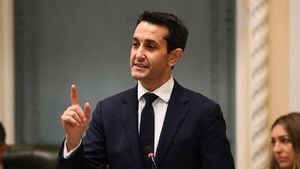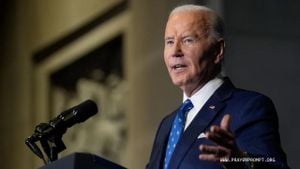Australia is gearing up for significant changes to childcare policies as Prime Minister Anthony Albanese pledges to eliminate the controversial activity test, allowing more families to benefit from childcare subsidies. This policy shift aims to combat inequalities and reshape access to early childhood education across the nation.
The activity test, implemented in 2018, has been criticized for limiting access to subsidized childcare based on the number of hours parents work or volunteer. Currently, many parents, particularly from low-income families, struggle to meet these requirements, leaving about 126,000 children without access to childcare. Albanese emphasized the need for children to gain early access to education, making it clear, "Every child has the right to go to early education, to help get them ready for school."
These changes are part of Labor's broader strategy as the 2025 federal election approaches, with the party aiming to present itself as the champion of working families. The proposed reforms include guaranteeing three days of subsidized childcare per week for families earning up to $530,000 per year and building 160 new centres across Australia. The PM stated, "This means children in these communities are left behind and families are left with no option." This investment will not only improve access but also address childcare shortages, particularly in regional and outer suburban areas.
The activity test has faced heavy criticism, particularly from advocacy groups such as The Parenthood and the peak body for Aboriginal and Torres Strait Islander children, SNAICC. They argue the test deepens disadvantage for vulnerable children and limits parental participation in the workforce. Advocacy from these groups has led to growing support for reforms, with many voicing hope for the changes following the election.
When the activity test was introduced, it was intended to encourage parents to engage more with the workforce or education. Yet, for many parents, especially those working casual jobs with fluctuated hours, it created challenges. Megan Hunt, a nurse and mother of two, expressed frustration about how the system doesn't account for parenting responsibilities. "I am at home caring for my younger child, and it's frustrating knowing this doesn't help my older child access childcare. It feels like it's tied up with what parents do rather than considering what benefits the child," she shared.
The Prime Minister's government has promised to address these challenges, linking the changes to their commitment to achieving equity and support for families. "We’re vying for universal childcare as part of our commitment to providing equitable services across Australia, recognizing early childhood education as foundational for building skills and social inclusion," Albanese stated.
An important factor behind these changes is research conducted by the Productivity Commission, which highlighted the importance of early childhood education. The Commission documented how children flourish when they have access to high-quality learning environments during their formative years. Removing the activity test could lead to increased attendance at childcare settings, with estimates indicating about 10% growth predominantly from lower-income families.
Many communities are excited about the prospect of new childcare facilities, which will ideally be situated near schools. This integration could help streamline the experience for families, making it more hassle-free to manage school and childcare commitments. The initiative could provide employment opportunities for educators, pushing the narrative of education and childcare as interconnected pathways for children’s development.
Despite the optimism, critics from the opposing political camp believe these announcements are merely campaign strategies rather than comprehensive solutions to existing problems. They argue Labor’s approach will benefit only some families and warn the resource allocation may strain budgets amid rising costs of living. Shadow Minister for Early Childhood Education Angie Bell stated, "At a time when Australian families are already struggling under Labor's cost-of-living crisis, this policy will increase demand within a system that's already at capacity."
This skepticism highlights the contentious nature of the childcare debate, where many stakeholders—including parents, educators, and policymakers—continue to vy for their views on the best ways to support children’s early development. The new reforms aim to align with community needs, advocating for policies responsive to the realities of modern parenting.
New centre construction may begin as early as mid-2025, but questions remain about their location and the adequacy of funding levels. Concerns have been raised about whether 160 new centres will be sufficient to meet the rising demand. The current framework supports over 700,000 licensed places across more than 9,000 registered long-day care centres, yet advocates believe availability, especially for rural and regional families, remains insufficient.
Albanese's government is approached as taking bold steps toward universal childcare, recognizing it as foundational for not only individual development but also long-term economic gains for Australia. Early intervention via childhood education is often heralded as the key to ensuring children enter primary school equipped with the necessary social skills and learning foundations.
These proposed shifts present both hope and challenge, marking what could be deemed significant leaps toward enhancing childcare accessibility and quality. Albanese's team has openly committed to this "nation-defining" policy framework, and the coming months will prove pivotal as families, experts, and opposition parties react, grind through campaign trails, and keep their eyes on what the future holds for childcare across Australia. The ambition remains clear—creating equitable access to education for all children, which is lauded by advocacy groups hoping for systemic change.



